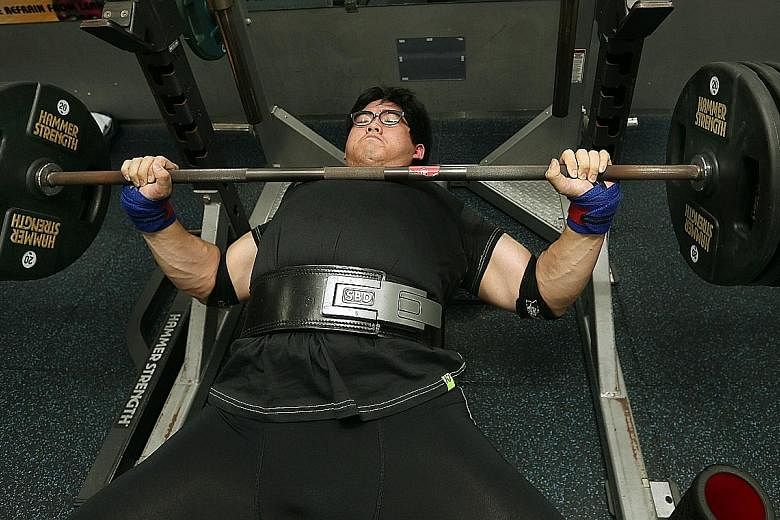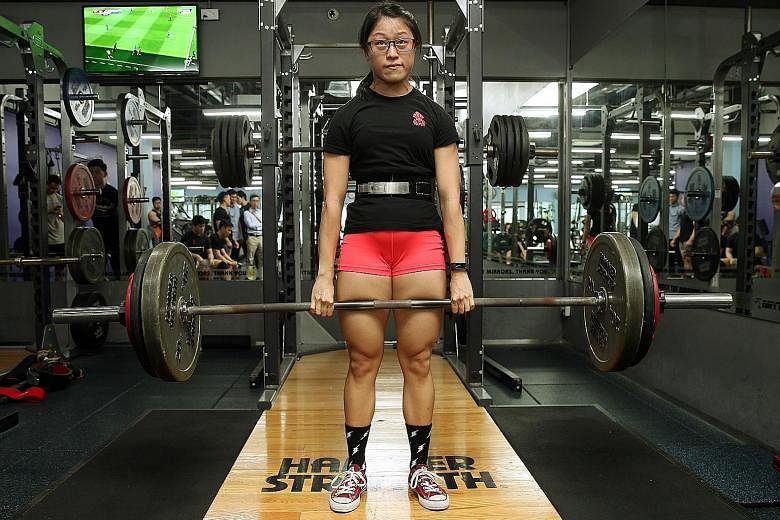The idea of picking heavy things off the ground for recreational purposes sounds alien to most people, especially when the weights to be lifted can be more than three times one's body weight.
For some, however, it is a way of life, guiding the way they structure their time, eat their meals and the amount of liquids they drink.
Competitive powerlifters, like the recent world record-breaking Singaporean Matthew Yap, train with rigorous discipline.
To qualify for a certain weight category for a competition, lifters would cut calories and shed water from their diets, while adhering to strict training schedules.
Dr Ong Joo Haw, consultant sports physician at Khoo Teck Puat Hospital's Sports Medicine Centre and medical chairman of Powerlifting Singapore, is a competitive powerlifter.
He trains at Powerlifting Singapore, an association dedicated to the sport that was set up in 2011.
Dr Ong said: "It's about following the training programme and making adjustments according to how you feel. This is because there will invariably be day-to-day differences in a lifter's condition."
-
Powerlifting
-
Powerlifting is a strength sport comprising three attempts at maximal weight on three lifts - the squat, bench press and deadlift.
It is distinct from Olympic weightlifting, as the lifts are different in nature.
Contestants are divided by weight class and compete to have the highest maximum combined weight on all three lifts.
More than just a show of strength, competitive powerlifting involves much planning, discipline and strategy by the participant and his coach.
Powerlifting is a relatively new sport in Singapore. It is administered by Powerlifting Singapore, an association which grooms talent and holds competitions.
Powerlifting Singapore competes under International Powerlifting Federation rules.
People can take inspiration from powerlifting and integrate some strength training with weights into their exercise regimen. This helps to improve one's bone health, prevent falls and even reduce the risk of diabetes, say doctors.
BENEFITS OF STRENGTH TRAINING
Strength training is any form of physical training that improves the ability of the body to output force. Powerlifting is the competitive form of strength-based exercises.
Strength training has many other benefits that can boost one's overall health. Dr Ong said: "Strength training should be part of any fitness programme, with other components such as cardiovascular fitness and flexibility."
In general, cardiovascular exercises include running or swimming. Workouts that feature stretching moves, such as pilates, help improve flexibility, though Dr Ong said that simply stretching well and frequently is good enough.
Strength training has been shown to improve body composition by increasing the total amount of skeletal muscle that a person has.
Body composition, which refers to the relative make-up of a person's body mass, comprising fat, muscle and organs, has been shown to be a better indicator of physical health than body mass index (BMI). This is because BMI does not take into account the amount of body mass that is made up of fat.
Increasing skeletal muscle mass has benefits such as lowering the risk of problems such as osteoporosis and diabetes, which are becoming prevalent in Singapore's greying society.
Lifting weights has also been shown to improve physical and cognitive functioning in older adults, said Dr Ong.
Load-bearing and muscle-building exercises increase bone density. This is especially true for high- impact exercises, such as running or jumping, as these result in bone remodelling, where more bone is laid down in response to a stimulus.
Falls are also less likely when one has stronger muscles and overall better coordination as a result of strength training.
Increased muscle mass also contributes to improved insulin resistance, thus reducing the chance of diabetes, according to Dr Ong.
Having a higher proportion of muscle in the body increases the amount of energy burnt while at rest, known as resting metabolic rate. This could be helpful in weight management as well.
For Ms Joanna Cheng, 26, lifting weights has had a positive effect not only on her physical health, but mental wellness as well.
She said: "I was going through a difficult time in my life. My friend, a powerlifter, bought me a month's trial at a gym to help me cope with my depression. I have continued working out ever since."
DON'T STRAIN YOUR BODY
As with other high-intensity physical activities, any form of strength training carries the possibility of injury. "Powerlifting injuries include overuse problems and impingement syndromes around the knee, hip, shoulder and elbow. Acute soft-tissue injuries such as back strain, muscle tears or tendon ruptures are also seen on occasion," said Dr Ong.
Even non-competitive training can result in injuries.
Ms Cheng, who suffered a tear in the cartilage of her shoulder in April, said: "I was lifting weights and was tired after the shoulder workouts. My left shoulder couldn't support one of the weighted exercises and it gave way."
She is still recovering from the tear, though no surgery was needed.
With proper preparation, such injuries can be avoided. Newbies should follow the proper techniques and seek the advice of experienced powerlifters.
Dr Ong said: "People have to be mindful of having a good training programme that allows for progressive loading and maintaining overall conditioning and flexibility."
GETTING STARTED
Going to the gym and picking up weights can be an intimidating experience.
Dr Ong has this advice for newbies: "As with everything else, start low and go slow. If you approach it with an open mind and are willing to learn, there are lots of people willing to help you out."
For Ms Cheng, lifting weights has helped her.
She said: "I'm a firm believer in training and strengthening muscles, whether you want to lose weight, get a better posture, be less injury-prone or look better."



